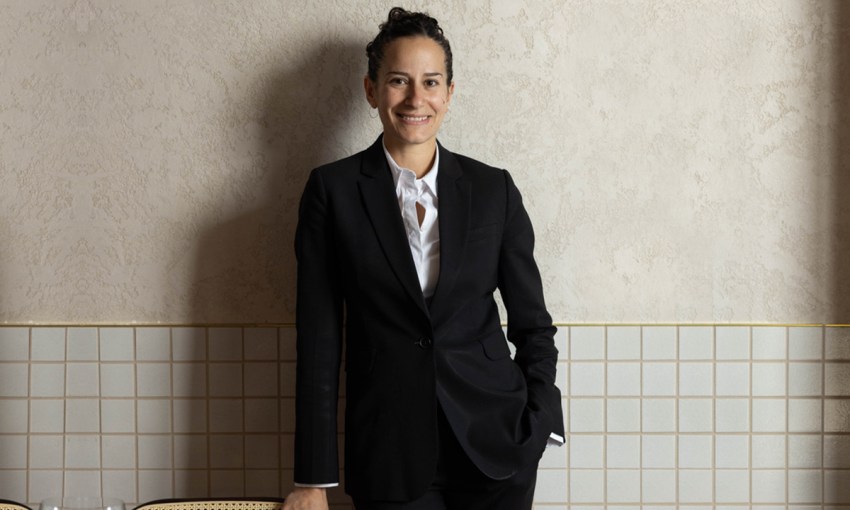She is the general manager of the newly reinvigorated Press Food and Wine, as well as Peel Street Restaurant and Leigh Street Wine Room, and she wants set a higher standard for Adelaide hospitality.
Meira Harel is remaking Adelaide’s hospitality industry
Meira Harel came to Adelaide in May 2019 with the hope of bringing change to Adelaide’s hospitality scene.
As a sommelier with experience working in her home country of Israel and in venues throughout Victoria, including Brooks, Grossi Florentino, Lake House and Town Mouse, she came to Adelaide to find balance in her life and career.
She and her partner, fellow sommelier Banjo Harris Plane, then had one young child already and another was not far away. They felt “we had maxed ourselves” in Melbourne, Meira told CityMag in September 2019.
By being in Adelaide, she and Banjo could be close to Banjo’s parents (Adelaide locals), and make the most of the familial support available to them.
Meira’s plan was to work part-time as an industry consultant while also building GROW Assembly – a hospitality conference the duo founded in 2016.
The first Adelaide GROW event happened in October 2019, and was themed around finding balance in a hospitality career. Speakers ranged from new local entrants, such as Sali Sasi, then co-owner of Leigh Street Wine Room; established hands like Gill Gordon Smith and the Lucia’s family; and hospitality-adjacent players, like designer Emma Aiston of Daniel Emma.
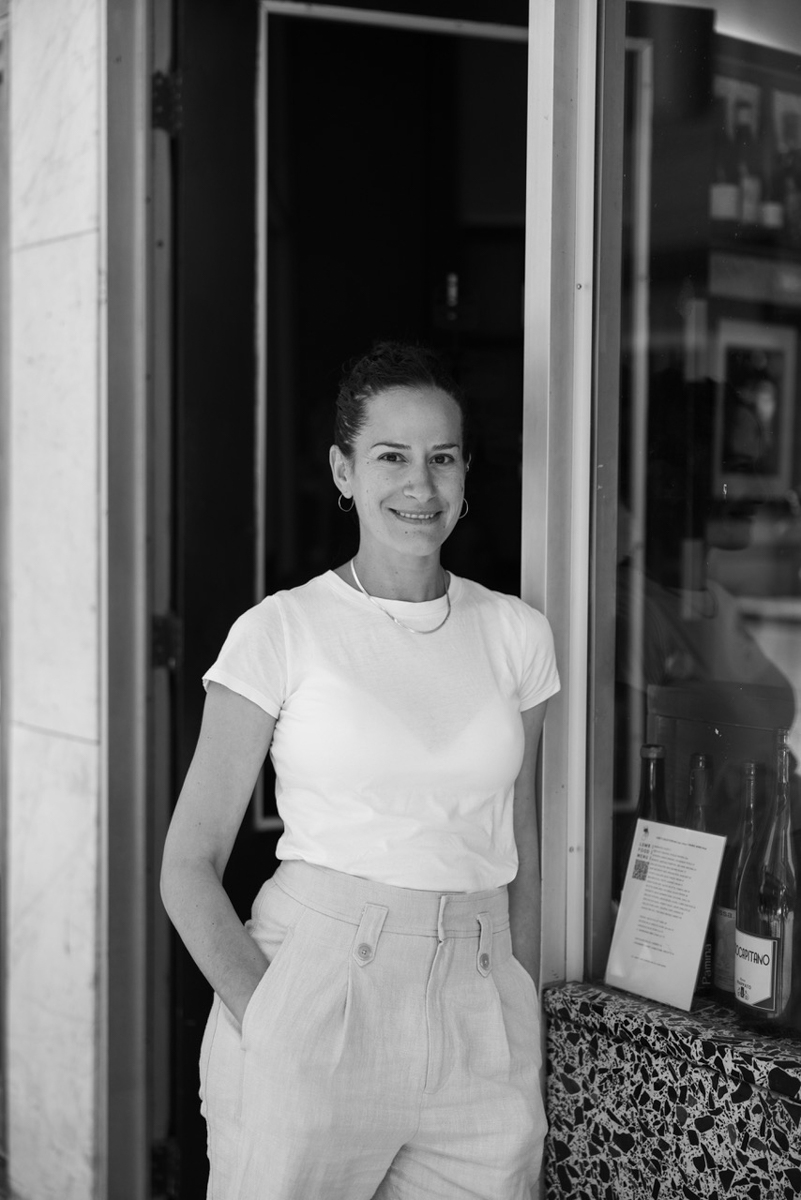
Meira outside Leigh Street Wine Room, which she helped open in 2019
Bringing people together to facilitate conversation was how Meira hoped to have influence in Adelaide’s hospitality scene.
Months later, in March 2020, the industry shutdown. A month after that, Meira and Banjo welcomed their second child. She then spent much of the following two years watching from the outside as the industry she loved scrambled to make sense of a rapidly evolving world.
“It was heartbreaking. Heartbreaking,” Meira says. But in a bittersweet twist, it forced a reckoning upon the hospitality community that Meira had been trying to ignite through GROW. Workers were finally given the space to consider what role their jobs played in their lives.
For some, taking stock meant choosing to leave restaurants for other industries. Meira saw an opportunity to build back better.
“Only something like this could break all the rules all of a sudden and [allow us to] look at things from the outside and [ask], ‘How do we restructure things?’” Meira says.
Meira re-entered the food and beverage scene softly in September last year, taking work at The Smelly Cheese Shop. Soon after, she received a call from Nathan Sasi, co-founder of Leigh Street Wine Room, who had recently sold a majority stake of he and Sali’s business to hospitality newbie Jay Patel.
The call was about a leadership role that had opened up within Jay’s burgeoning hospitality group, which consists of Leigh Street Wine Room, Peel Street Restaurant, Press Food and Wine and online wine retailer Juice Traders.
“He said, ‘Look, Jay just needs someone to lead this thing. He knows what he wants, but it’s not his industry. He’s a great man, he’s got visions and ideas’,” Meira recalls.
“At the time, [Nathan and Sali] still had 10 per cent in the business, and it was important, from their point of view, to have someone looking after Leigh Street and Juice Traders.”
New here? Sign up to receive the latest happenings from around our city, sent every Thursday afternoon.
It was a part-time gig, but it would allow Meira the chance to set the tone across multiple businesses and put into action the beliefs she espouses through GROW.
“I had run restaurants and I’ve run wine lists, but I’ve never run a few at a time – but I knew this was the progression I wanted for my career,” she says.
“It allows me to have flexibility as a mum, which is the number one priority for me.
“And just that next step of working on the business, rather than working in the business, so you won’t really find me on the floor… I’m really working on structuring the power of us as a group.”
For Leigh Street Wine Room and Peel Street Restaurant, there has been a tightening of screws and polishing of finer details.
“It’s time to shuffle away from the white ceramic plates that are café-like,” Meira says. “Giving those touch-ups that retain the experience, retain that food offering.”
At Press, there has been a wholesale overhaul, with the introduction of new executive chef, Tom Tilbury, and a new fitout – a reimagining of the restaurant by its original designer, Claire Kneebone, which has done away with the darker and heavier elements.
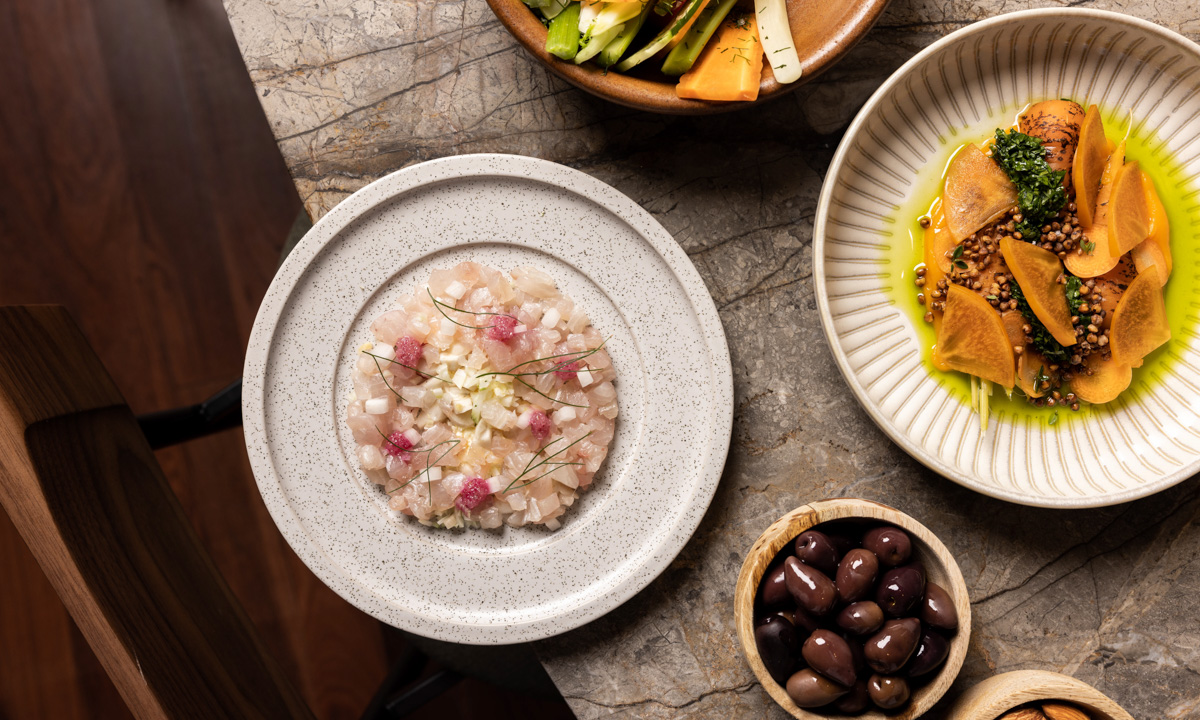
New dishes at Press Food and Wine
“We’ve stripped all of that timber and black walls,” Meira says. “The dining room is much more relaxed, there’s a huge bar in the middle, so that kind of sets the tone of the space.
“You could wear a suit or walk in high heels, or you can just wear your denim and whatever and that will be completely fine.”
The remaking of the restaurant was necessary to delineate it from its former life within the Simon Kardachi family of venues.
“It’s no longer part of that group, it’s part a new group, so I needed to make that cut and make it clear,” Meira says. “I want people to know that this is representing us, and that we do what we believe in.”
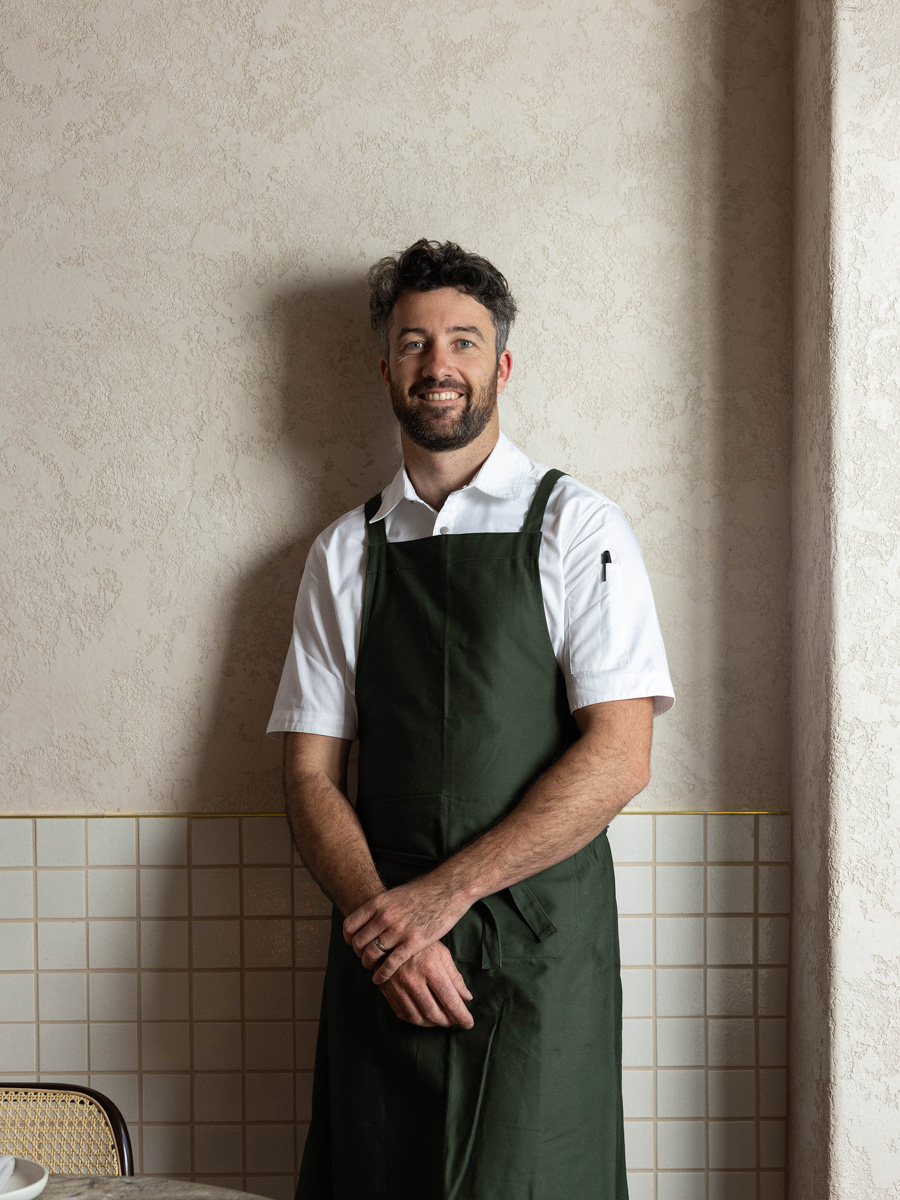
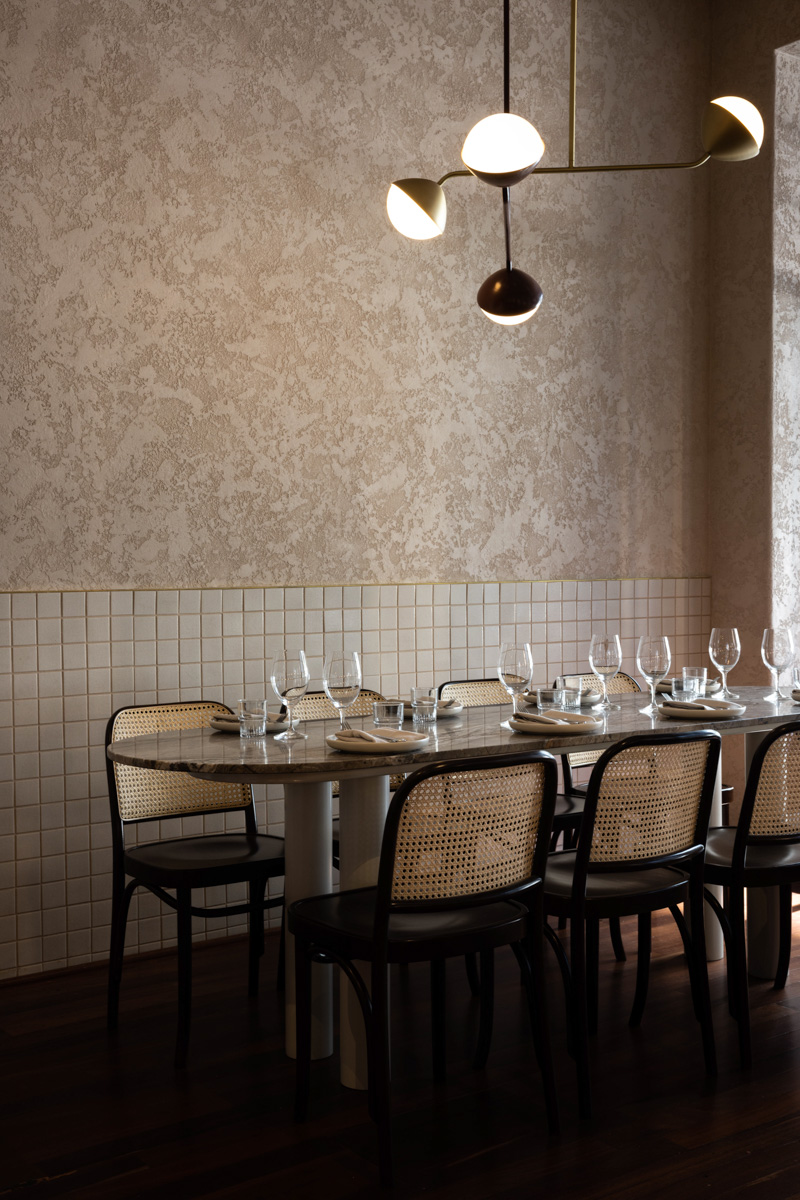
Above: A new aesthetic at Press; and new executive chef, Tom Tilbury
Across all three businesses, Meira wants to counteract a mindset she has seen in Adelaide kitchens – one which CityMag will categorise as well-meaning humility.
“A lot of what I hear is, ‘Oh, it’s good for Adelaide’,” Meira says.
“I’m like, ‘Well, scrap that. What does that even mean? That’s not the highest we should aim for. Let’s go higher and higher and higher, and keep polishing what we’re doing’.
“Even if we’re doing great, there’s still more work to be done, and everything is in the details.”
There has been conflict in this process, Meira says, but “I see conflict as a good thing, as long as you manage it the right way”.
“Without change and conflict,” she says, “there is no excellence.”
Although all of the businesses in Jay’s venue group existed prior to his taking them over, Meira sees their combined effort as a new presence in Adelaide’s hospitality scene. The group still doesn’t have an official name, and she says it feels more like “a startup at the moment”. But there is ambition. “We’re not Google – yet,” she laughs.
Her aim is for the Patel group to be a cultural leader in the Adelaide hospitality scene (and interstate, with Jay likely to extend his reach across to the eastern seaboard).
Meira wants to use the group to build an education network among hospitality careerists in Adelaide, even those from outside of the company.
“We definitely want to be a leader in the space of education, and with my background, and with the work we’ve done with GROW, we’ve got the foundation for that,” Meira says.
“I’m happy to open the doors – bring them all. Let’s make those masterclasses happen. Let’s become partners, let’s make this happen together, and we’ll provide for people to come from anywhere and learn and become better.”
This aspiration for cultural leadership also extends to the way the business runs at the ownership and management level.
For all the goodwill associated with our favourite restaurants and cafés, hospitality is an industry known for exploitative working conditions. Meira believes there are ways to structure businesses that protect, retain, and encourage staff – instead of burning them out with constant 80-hour weeks.
“I work very close with the teams in terms of keeping that balance and looking after them, because that’s part of what I’m layering at the moment for our hospitality group, is to have that value, the value of personal life,” Meira says.
“I think it’s so important. I want people to have time to go to the museum or have time to spend with their girlfriend or whatever, so they can excel in their work.”
This also extends to the way women are treated in the industry. With so much of the workforce in casual positions, and so much of the work dependent on physical attendance, hospitality has a problem retaining women who choose to have families. Meira knows this from experience. She sees that her hospitality group can set the new standard.
“A big part of this is making sure we retain highly talented women in our industry if and when they decide to have a family,” Meira says.
“It’s not like in any other industry, and I want to make sure we don’t lose all this talent around us, and make a way – and there are many ways – to keep them around in respected and relevant positions.
“It’s time for our industry to step up in that space, do the right thing and think out of the box. I know that many people do this already but we should keep pushing for this until the standard is there.”



